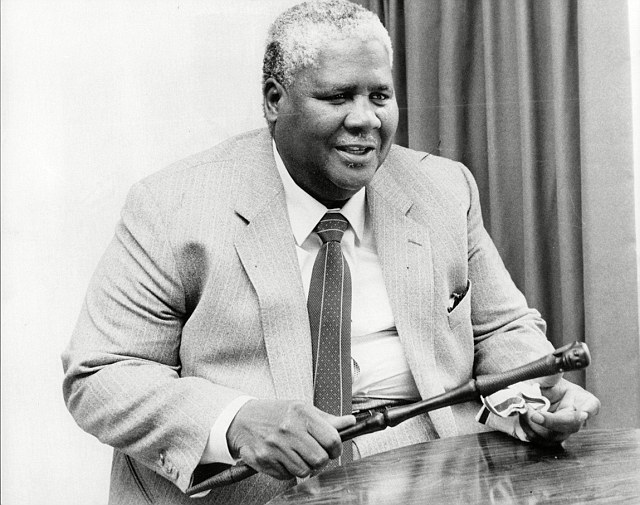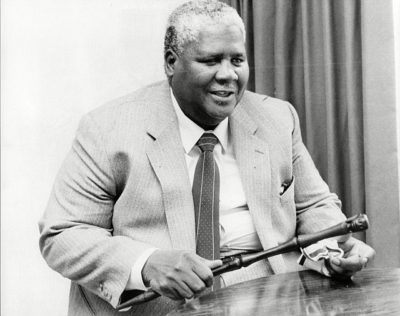Source: Inside Joshua Nkomo’s playlist | The Sunday Mail
Bruce Ndlovu
IN his autobiography, ‘The Story of My Life’, the late nationalist and Zimbabwe’s former Vice-President Dr Joshua Mqabuko Nkomo, made no secret of his love.
A radio had been his companion in the darkest moments of detention at the hands of Rhodesian forces.
In fact, after ten years at the Gonakudzingwa Restriction area, his radio was one thing that he had refused to hand over to the authorities on the day he was supposed to be transformed to his new home, a prison at Buffalo Range.
“On arrival I was searched and they took all my personal belongings, even my watch. On leaving Gonakudzingwa I had removed my faithful radio from the medicine cabinet where I had kept it hidden all those years, and I flatly refused to hand it over. The man just looked at me and I put it in my overcoat pocket . . . ,” he wrote in the chapter titled, The Taste of Freedom.
Mqabuko’s radio was the one gadget that connected him to an outside world that his jailers were determined to isolate him from. From it, he could find out where and when the country’s liberators had struck and the latest attempts by the Rhodesians to stall the country’s inevitable march towards independence.
The radio also gave him a chance to listen to his beloved Dolly Parton.
“He loved all kinds of music, particular country, western and reggae music. In particular he loved music by country star Dolly Patton. She was one musician whose songs he turned to for inspiration.
In the dark moments of his life, he would turn towards her music because it gave him inspiration,” said the late nationalist’s son Sibangilizwe Nkomo in an interview. Patton was not the only artiste to grace Nkomo’s ears when things got tough. American country, soul and pop music artiste Doby Grey was another musician who stoked the fires of hope in Dr Nkomo when the chips were down.
“I’ve been too long in the wind, too long in the rain, Taking any comfort that I can,
Looking back and longing for the freedom of my chains, Lying in your loving arms again.”
These were Grey’s lyrics in the song Loving Arms. According to the late nationalist’s son, the song was a particular favourite of a man whose own loving arms had earned him the title of Father Zimbabwe.
“He loved that song, particularly those lyrics. As you can tell, the song’s lyrics were pregnant with meaning and so he loved the lesson and inspiration behind them,” he said.
No revolutionary worth his salt would hear a Bob Marley verse and pass without a pause and this was the same for Mqabuko, who also now and then turned to the dreadlocked champion of the oppressed for inspiration.
“He also loved Bob Marley’s music as was the case with many people from that era,” said the younger Nkomo.
In his biography, Dr Nkomo made it clear how he had been connected to the traditions of his people. So connected was he to his roots that he would discard the shorts his mother brought him for ibhetshu while on the way to school.
“When I went to school my mother wanted me to look smart and brought me some short trousers. This was an embarrassment as all the other boys wore amabhetshu, a little loin-cloth of skins suspended around the waist by a thong.
“So each day I left home in my shorts and slip on my leather garment. Then on the way home I would do the same the other way round, making sure that none of my school mates knew what I was up to,” he wrote in a chapter titled An African Heritage.
This strong connection to his African roots was also highlighted in some of the music he listened to. “He loved i-music yesintwini. He loved isitshikitsha but in particular he loved a song called Isivunguzane,” said Nkomo.
While his taste in music was constant, Mqabuko’s sound system was always in constant state of evolution.
“The radio that he had at Gonakudzingwa was a Supersonic radio. After he was released, he brought a WRS radio which had a built-in sound system. It was big, stood on four legs and was more like a cupboard than a radio.
“When my sister turned 18 he gave it to her. He then bought a Super 10 stereo which, unlike the WRS, had speakers separate from the radio,” said Nkomo.


COMMENTS